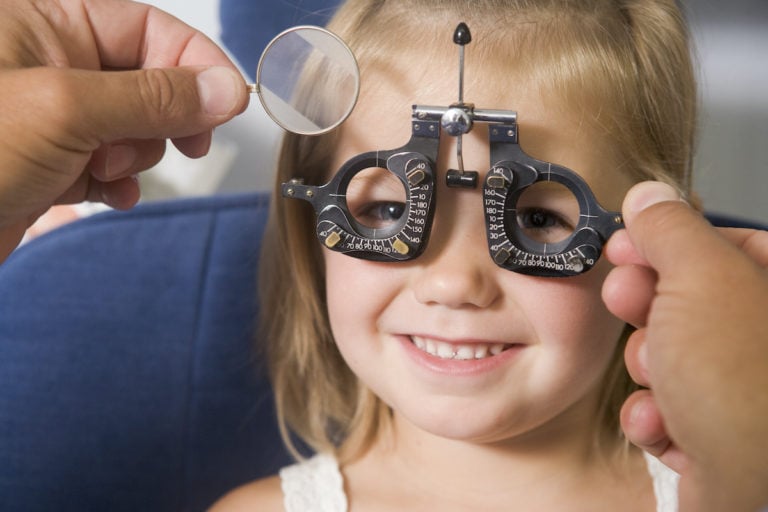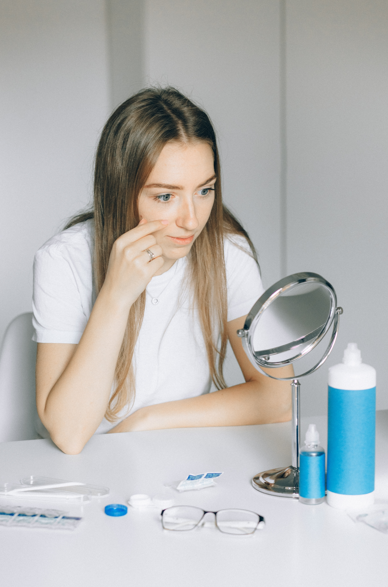It’s a birthday that many celebrate with some trepidation. It’s the big four-zero and it’s the start of a decade that has more than its share of ups and downs. On the upside, one is still relatively young, and have the confidence that comes with experience. On the downside, a whole lot of medical professionals will be telling them to be a little more careful with their health, and their eye doctor will be among them.
That’s because eyes change over time, and just as their joints might be feeling a bit more creaky than they did when they were in their twenties, their eyes aren’t as flexible or as strong as they were before. Here’s what they can expect from their eyes after 40 and what they can do about it.
1. “Long Arms” for Reading
The lens of the eye flexes to allow for the switch between near and far vision. Over time, it loses its flexibility, and even those who never needed glasses before may find that they need specs for reading. “It’s one of those things,” says Australian behavioural optometrist Jacqueline Gattegno, proprietor of Eyes in Design Bondi. “If you haven’t been going for regular eye tests before the age of 40, you should certainly begin to do so.”
2. Dry Eyes
Every time someone blinks, their eyes are lubricated with tear fluid. There are a lot of different reasons for dry eyes including long hours spent in front of the computer, dry air, and ageing eyes. One can experience dry eyes at any time of life, but once someone is over the age of 35, the chances increase. Women who are experiencing menopause or are past menopause are more likely to get dry eyes than men are, but that doesn’t leave men with one less thing to worry about. They can get dry eyes too.
Although dry eyes are uncomfortable, they aren’t ordinarily a direct threat to a person’s vision. Nevertheless, one should let an optometrist take a look and see what’s causing the problem. “Special drops can relieve dry eyes,” says Jacqueline. “You can also try helping your eyes by taking fish oil capsules and drinking lots of water.”
3. Reduced Night Vision
In time, the photoreceptors in the eyes begin to age and that means that seeing in poor light becomes more difficult. “An optometrist can’t improve your night vision per se,” says Jaqueline, “but making sure that your eyewear prescription is correct will help to some degree.”
4. Glaucoma
There was a time when having glaucoma meant that the person would experience vision loss – sometimes even total vision loss. Glaucoma is a build-up of pressure inside the eye and it can damage the optic nerve. However, if glaucoma is diagnosed early, it is treatable: one more reason to go for those eye examinations. The older a person is, the more important this becomes. Glaucoma is still a leading cause of blindness in people over the age of 60.
5. Cataracts
Cataracts form when the proteins in the eye’s lens clump together, clouding the lens and blurring vision. Someone might notice them because they’re seeing halo effects when they look at lights, because their night vision is becoming worse, or because they’re experiencing blurry vision.
“If cataracts are so bad that stronger glasses can’t restore vision, laser surgery solves the problem,” says Jacqueline. “It’s not a major procedure, and the success rate is excellent. Surgery may sound worrying, but it doesn’t require a stay in hospital, and the chances are excellent that your vision will be better than ever before. It’s definitely not something to be scared of.”
6. Macular Degeneration
The macula is part of the eye, and it consists of light-sensing cells. If the macula begins to degenerate, vision becomes blurry. Left untreated, it is likely to end in loss of vision, but, says Jaqueline, treatments can slow the process, preventing severe vision loss. Macular degeneration affects in the region of 14 percent of people over the age of 80. “It’s not something that affects all people with ageing eyes,” says Jacqueline, “but it’s something to look out for since the damage isn’t reversible.”
Take-Home Message
Eye examinations become even more important once a person is over 40. There’s no need for people to be overly worried about any problems an optometrist may pick up – as long as they’re going for fairly regular check-ups. Some age-related eye problems may require treatment or surgery, but in general, the outlook is good as long as the diagnosis is early.
HEAR: Ultra106.5FM Interview with Jacqueline Gattegno – Changes in Eyesight Due to a Rise in Stress Levels
For more information on eye health, visual skills and therapy, or to book an appointment, visit the Smart Vision website: Optometrists Sydney: Optometry Services For Children and Adults | Smart Vision; for specific information about Myopia treatment and prevention visit Myopia Prevention: Solutions, Control And Treatment In Sydney; and for detailed information about Myopia Treatment visit Orthokeratology In Sydney: The Non Surgical Alternative.
Book an appointment for a thorough eye check-up or Call the Bondi clinic on (02) 9365 5047 or the Mosman clinic on (02) 9969 1600.







